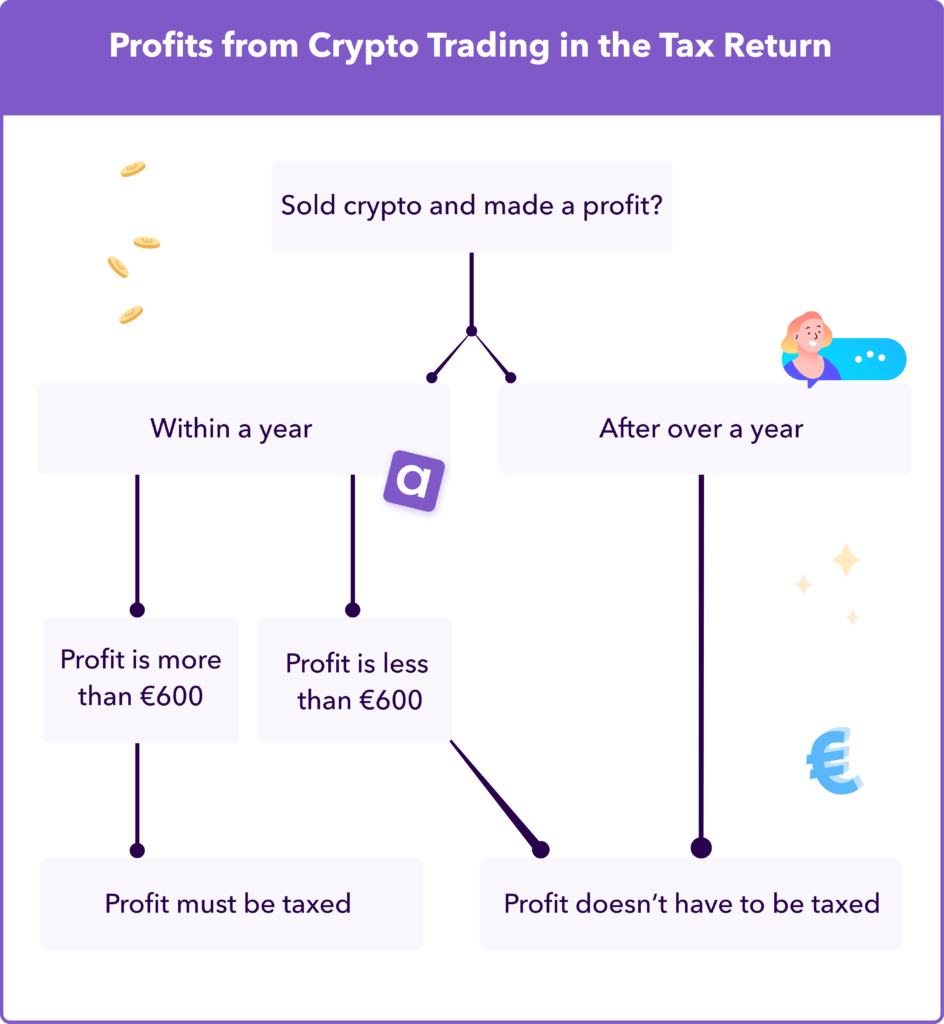You invested in a cryptocurrency such as Bitcoin, Ethereum or Dash? Now you're wondering whether you have to pay tax on the purchase and what exactly you need to state in your tax return? Here you find out everything you need to know about taxes and cryptocurrencies.
Although cryptocurrencies are not considered official currencies or investments in Germany, such as real estate or savings accounts, they do provide an economic benefit and fall under 'sonstige Wirtschaftsgüter' ('Other Assets') for tax purposes. Therefore, they may be taxable.
To know how much tax is due, it is important to note the purchase price and the time of purchase. So record when you bought cryptocurrency and how much you paid. Especially if you buy frequently or own different coins, it is worth creating a table of purchases and sales.
When selling, it is generally assumed that those shares you bought first, will also be the ones you sell first. This method is called FiFo - 'First in First out'.
Especially because crypto is still a relatively new tax issue for the tax authorities, it is possible that your Finanzamt (tax office) will take a closer look and demand additional information from you. So always remember to document your purchases and sales well.
Are you trading cryptocurrencies as a private individual? If you buy digital currencies such as Bitcoin, Ethereum or Theter within a year and sell them again in the same year, it's possible that you have to pay tax on them. Because if you make a profit on the sale, you have to pay tax on it.
In this case profit is defined as the difference between the purchase price and the selling price. It is thus calculated by deducting your purchase price and any transaction fees from the selling price.
When selling crypto consider that if you want to sell your shares after a year has passed, you do not have to pay tax. So if you keep your cryptocurrency for longer than 12 months, there is no tax on your profit.
There is also the exemption limit of €600 (called Veräußerungsgewinn). If you earn less than €600 from the crypto sale, this remains tax-free. However, if your profit from the sale exceeds this limit, the entire amount will be taxable. So if your profit is €601, you have to pay tax on the entire profit and not just €1.
Also note that this €600 applies to all of your private sales transactions. So if, in addition to the sale of cryptocurrencies, you also have profits from the sale of gold or vintage cars, for example, the total profit from all sales must not exceed the €600 exemption limit.

If you sell your shares in a cryptocurrency, they are taxed at your individual income tax rate. Depending on how high your income is, you have a certain tax rate (between 14 and 42%). You have to apply this to your profits. So there is no fixed percentage that applies to everyone.
This is because cryptocurrencies do not fall under 'Kapitalvermögen' (capital assets), such as profits from shares and stocks. There is a fixed tax rate of 25% (plus solidarity surcharge and church tax) that applies to income from capital assets.
Instead, gains or losses from cryptocurrencies are assessed as 'private Veräußerungsgeschäfte' (private sales transactions). These are declared as other income in the Anlage SO (SO annex) in your income tax return.
Also note that as soon as you receive interest on the amount, this is always taxable. It doesn't matter whether you sell your cryptocurrency within a year or later. 'Abgeltungssteuer' (withholding tax) is always due on your interest gains.
There are good news, especially for the self-employed professionals... there is no VAT due on the trading of cryptocurrencies.
To know exactly how much tax you pay on your crypto trading profits, you need to know your tax rate. This is based on a percentage of your income.
It ranges from between 14% and the maximum tax rate of 42%. It is important to know that income tax relates to profits. So it is important to state all professional expenses fully and correctly in your profit & loss statement (Einnahmenüberschussrechnung) which is part of your income tax return. In this way, you can reduce your profit a little and may be subject to a lower tax rate.
If you sell your cryptocurrency at a loss, consider whether you have any gains from other 'privaten Veräußerungsgeschäften' (private sales transactions). You can offset these against it.
You carry out private sales transactions, for example, when you sell real estate that you do not use yourself. This also includes the sale of gold or bitcoins and other cryptocurrencies.
This also applies the other way around. So if you have losses from other sales, you can offset these against possible gains from the sale of crypto shares.
Profits and losses from cryptocurrencies are entered in the income tax return in the Anlage SO (annex SO) for 'other income' in lines 41 to 46. Start with line 41 by entering the type of asset, i.e. what type of income you have. For example, in the case of crypto "Sale/trade in cryptocurrencies" could be noted here.
If you have regularly traded cryptocurrencies throughout the year, it is advisable to prepare another table with detailed evidence of the profits or losses. This way, you have proof should your Finanzamt inquire about it.
If you do not trade in cryptocurrencies as a private individual, but do so as a professional business, different rules apply to you. This is because the profits are not tax-free after one year, but are always taxable.
As things stand, however, it is not yet clear when trading in cryptocurrencies is considered a commercial activity in Germany.
The good news is that even if you trade very often and have frequent reallocations, you are not directly considered a commercial crypto trader. This means that most people do not have to worry about the tax obligations of traders for the time being.
Tip from Accountable💡: It is important to be able to prove your profits to the Finanzamt and, if necessary, be able to verify that you have not made any taxable sales. So remember to always keep evidence and document your trading well.
The easiest way to do this is with a tax software like Accountable. This gives you full control of your bookkeeping and tax returns at all times. Find out more here!
20 Kapitel knallhart recherchiert und vom Steuerprofi geprüft
Kostenlos herunterladen

Author - Sophia Merzbach
Sophia has been a key member of the Accountable team for many years, bringing a unique blend of journalistic precision and in-depth tax expertise to her work.
Who is Sophia ?Thank you for your feedback!
Useful
How much income tax is deducted from your income is largely determined by your tax class. There are ...
Read moreWorking as a self-employed professional has many advantages: You are your own boss and you can choos...
Read moreWorking with international clients can be tricky, depending on where exactly they’re located, whet...
Read moreIt's perfect for an expat like me who struggles not only with the tax system in Germany but also with the language. I love how easy it makes it for me to submit my documents every month and to have an overview of my revenue/expenses too. And when I have questions, I always get the answers either through the AI assistant or in some of the information pages :)
Rosana Pombo Cruz
Tolle Software, die einem Selbständigen die meiste Arbeit, was Steuern, Buchhaltung etc. abnimmt. Und dazu noch ein kostenloses Girokonto. Perfekt!
Anonym
TOP TOP TOP TOP
Yuriy Gromov
Super Tipps, sehr hilfsbereit, bisher super zufrieden
Philipp Nowak
Ole hat superschnell geantwortet und den Nagel auf den Kopf getroffen. Weiter so, Ole!
Anonym
Die Einfachheit und Übersichtlichkeit und vor allem – falls nötig – den sehr persönlichen Kontakt mit helfendem Personal
Anonym
Sehr gut.....
Oleksandr Antosiuk
Ja man muss sagen alles super auch wenn es zwar dauert bis wer antwortet auf grund der Masse an Anfragen kann ich die kompetenz und die weiter bearbeitung und die Erklärungen der Mitarbeiter nur weiterempfehlen! Sie erklären auch so das ein Anfänger alles super versteht und damit super Arbeiten kann.
Denis Wenzel
Ich hätte schon viel früher in Accountable investieren sollen. Jahrelang war Buchhaltung für mich ein echter Kampf. Zugegeben – Accountable ist nicht die günstigste Lösung auf dem Markt, aber für mich definitiv die intuitivste.
Anonym
Simplicity, trust, guidance.
Flamur Abdyli